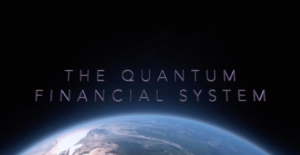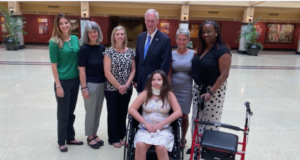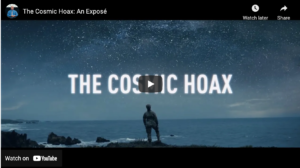
The news stories and videos are coming out faster and in more numbers than allow for individual posting. So wherever possible we’re going to combine them.
Thanks to Kathleen, Len, and Brian and to Suzi on Buy me a Coffee for their research.
The Quantum Financial System
Hit graphic to watch video
Rumble — NESARA GESARA is being implemented as we speak.
Adverse Vaccine Reactions Press Conference Recap
Hit graphic to watch video
July 1, 2021
Rumble — All they are asking for is the chance to be seen, heard and believed. They were first in line to get the vaccine, even participating in clinical trials. But now they say the medical community has turned their back on them after adverse reactions. Senator Ron Johnson talks about why he held a press conference in Milwaukee.
The Cosmic Hoax
Steven Greer discusses the presumptive agenda behind much of the Disclosure happening now. Deceit, disinformation, limited hangouts, cover-ups, etc., with the cooperation of the mainstream media.
Steven gives a blow-by-blow description of the military/industrial plan to weaponize Disclosure and push an alien-threat scenario.
Hit graphic to watch video
James Gilliland responds by criticizing Steven Greer: “ECETI’S James Gilliland Unveils Ufologist Dr. Steven Greer’s Agenda,” July 5, 2021, at http://howtoexitthematrix.com/2021/04/14/ecetis-james-gilliland-unveils-ufologist-dr-steven-greers-agenda/.

mRNA Technology Pioneer Blasts Big Tech Censorship
Era of Light, July 4, 2021
(https://reclaimthenet.org/mrna-technology-pioneer-blasts-big-tech-censorship/)
Dr. Robert Malone, a pioneer of mRNA technology, is being censored by Big Tech platforms. According to Malone, the mRNA-based COVID-19 vaccines carry some risks that are being downplayed by public health bodies and his statements are coming up against misinformation policies on many social media platforms.
Malone’s team conducted early research on mRNA back in 1990, showing that nanoparticles could transfect mRNA into cells before Hungarian biochemist Katalin Karikó worked on solving some of the obstacles in introducing mRNA into cells throughout the 90s.
Malone’s personal LinkedIn account was removed this week without warning or explanation.

“The historic record of what I have done, stated, figured out (and when) etc. over time is a key part of establishing my credibility and track record as a professional,” Robert Malone tweeted Wednesday. “And that has been erased completely and arbitrarily without warning or explanation.”
The premium LinkedIn account for the government and biotech consultancy business he runs with his wife Jill was not removed.
“He was given no notice, no warnings,” Jill wrote in a statement to Just the News. “He has a 10-15 year old account – has never even had a warning. 6,000 followers.”
Alex Jones breaks down how a study from the New England Journal of Medicine confirms that when pregnant women are given covid vaccinations during their first or second trimesters, they suffer an 82% spontaneous abortion rate, killing 4 out of 5 unborn babies.
It appears LinkedIn took issue with a recent post Malone made about Health Canada responding to the concerns him and other experts raised about the presence of the “spike protein” in the mRNA-based COVID-19 vaccines.
The Canadian health regulator warned about a small number of cases involving heart inflammation in young male adults and adolescents observed after receiving the Moderna and Pfizer-BioNTech vaccines.
In the since-unavailable post, Malone wrote: “This is certainly a big step forward in my opinion – particularly in contrast to the communication (or lack thereof) and denial from the US and other governments. At least we are now discussing the merits and limitations of the scientific data.”
The Microsoft-owned professional networking platform refused a request for comment on why Malone’s account was removed.
This was not the first time Malone was censored by a mainstream social media platform. A few days ago, YouTube removed an episode of the DarkHorse podcast, run by evolutionary biologist Bret Weinstein, where Malone warned about the spike protein in the coronavirus vaccines.
Following the removal, he appeared on Fox News and claimed that the CDC was yet to conduct “risk benefit analyses” of the vaccines, warning that in young people, the vaccines’ “benefits probably don’t outweigh the risks.”
YouTube demonetized the two channels that broadcast the DarkHorse episodes, a move Weinstein said would affect “more than half of our family income.”
According to Jill, YouTube “seems to be banning any content with him [Malone] in it.” She is of the opinion the platform is targeting her husband for contradicting the narrative by the WHO and CDC, which insist that the vaccines are safe.
According to Martin Kulldorf, a Harvard Medical Professor who was locked out of his Twitter account for a month for expressing skepticism on the effectiveness of masks, such censorship is dangerous.
Speaking to Just the News, Kulldorf said: “Open debate is especially important during a public health emergency when many important public health question[s] do not yet have a known answer.”
He said Big Tech platforms should reinstate all suspended accounts, because “To censor and silence scientists under such circumstances can lead to many unnecessary deaths.”
**By Christina Maas
*Source: https://reclaimthenet.org/mrna-technology-pioneer-blasts-big-tech-censorship/
 Federal Judge Rules To Unseal Ghislaine Maxwell’s Documents Possibly Implicating Clinton Organizations
Federal Judge Rules To Unseal Ghislaine Maxwell’s Documents Possibly Implicating Clinton Organizations
Era of Light, July 4, 2021
(https://eraoflight.com/2021/07/04/federal-judge-rules-to-unseal-ghislaine-maxwells-documents-possibly-implicating-clinton-organizations/)
A federal judge has ruled to unseal dozens of documents pertaining to disgraced philanthropist Ghislaine Maxwell’s personal affairs including her and Jeffrey Epstein’s relationship with the Clintons.
Disgraced financier and convicted sex offender Jeffrey Epstein reportedly committed suicide in jail while awaiting trial on August 10, 2019, prompting theories over his death to emerge.
Judge Loretta Preska ruled on Thursday that documents about Maxwell’s confidential affairs should be unsealed within the next two weeks. The judge argued that unsealing the documents, which have been long sought after by the press, would not impede Maxwell’s right to a fair trial as her lawyers have claimed.
Among the documents set to be made public within two weeks will be Maxwell’s legal efforts to squash requests from Virginia Roberts Giuffre, who sued Maxwell for defamation, to obtain her financial records, the Daily Mail reported.
Giuffre’s lawyers demanded Maxwell produce a wide range of documents including “funding received from the Clinton Global Initiative and the Clinton Foundation,” per court filings.
The judge ruled that the documents relating to a request from Giuffre for email accounts Maxwell kept secret from the court also be revealed. The potential revelations could implicate a number of powerful individuals including Prince Andrew of the British royal family, and others who had close personal ties to Maxwell and Epstein.
The Daily Mail reported:
The documents are part of a tranche of material gradually being released by Judge Preska from the defamation case Giuffre filed against Maxwell in 2016 for calling her a liar.
Giuffre claims Maxwell recruited her when she was 16 and took her to Jeffrey Epstein to be repeatedly raped and abused, including by Prince Andrew, which he denies.
The defamation case was settled in 2017 but after requests from the media organization the documents are gradually being unsealed.
In the hearing at New York’s federal court, Judge Preska said she was not impressed by Maxwell’s argument that “continued unsealing of these materials implicates her right to a fair trial in her pending criminal case” which is due to start in November.
Giuffre’s lawyers also seek to make public Maxwell’s tax returns, balance sheets and financial statements for companies she controlled including the TerraMar Project, Maxwell’s non-profit organization. The documents would include every detail of the funding Maxwell received from the Clinton Global Initiative, the Clinton Foundation, and the Clinton Foundation Climate Change Initiative.
While it’s unknown if the Clintons will be directly implicated in the documents, details on the matter will be made clearer after the documents are unsealed.
Bill Clinton’s relationship with Maxwell and Epstein was exposed after the financier was arrested in July 2019. Clinton reportedly flew on Epstein’s private jet dozens of times and was photographed receiving a neck massage from Chauntae Davis, one of Epstein’s victims who worked as a flight attendant on the airplane, which was infamously called the “Lolita Express.”
According to the Daily Mail, other documents to be unsealed relate to a request for information regarding an “undisclosed email account” Maxwell allegedly kept secret from the court in breach of an order to hand it over.
“Ms. Giuffre is aware of two email addresses that appear to be the email addresses defendant used while Ms Giuffre was with defendant and Epstein, namely, from 2000 – 2002,” said Giuffre’s lawyers. “Defendant has denied that she used those accounts to communicate, but she has not disclosed the account she did use to communicate during that time, nor produce documents from it.”
Emails already disclosed to the public show some of Maxwell’s personal communications with Epstein, which show the dead pedophile advising his confidante to hold her head up high and stop behaving like a “convict” after she faced accusations from Giuffre in 2015.

Workers are opting to leave unsupportive employers and transition to jobs in which they feel like they have better resources and are more cared for (Credit: Getty Images)
The Great Resignation: How employers drove workers to quit
BBC, July 1, 2021
(https://www.bbc.com/worklife/article/20210629-the-great-resignation-how-employers-drove-workers-to-quit)
People like Villareal are leaving their jobs – or thinking about it – in droves. A Microsoft survey of more than 30,000 global workers showed that 41% of workers were considering quitting or changing professions this year, and a study from HR software company Personio of workers in the UK and Ireland showed 38% of those surveyed planned to quit in the next six months to a year. In the US alone, April saw more than four million people quit their jobs, according to a summary from the Department of Labor – the biggest spike on record.
There are a number of reasons people are seeking a change, in what some economists have dubbed the ‘Great Resignation’. For some workers, the pandemic precipitated a shift in priorities, encouraging them to pursue a ‘dream job’, or transition to being a stay-at-home parent. But for many, many others, the decision to leave came as a result of the way their employer treated them during the pandemic.
That was the case for Villareal, who found herself back in the classroom after only a short closure. (In the US, private schools, governed by different rules, were able to return to in-person learning much sooner than public schools.) Villareal was uncomfortable about her safety, and saw her stress and workload spike when she was juggling both in-person and remote learners concurrently. She felt her concerns weren’t being addressed, or even heard.
Ultimately, Villareal decided she’d rather quit and start over in a totally new industry than remain in a job where she felt she was being under-valued and unheard. It was a tough choice, she says, because “there’s guilt as a teacher. You don’t want to leave the students”. Still, Villareal continues, “it became so clear that this isn’t about my health, the health of the kids or the mental wellbeing of anybody. It’s a business and it’s about money. The pandemic ripped that veil from my eyes.”
A predictable response
Foremost, workers are taking decisions to leave based on how their employers treated them – or didn’t treat them – during the pandemic. Ultimately, workers stayed at companies that offered support, and darted from those that didn’t.
Workers who, pre-pandemic, may already been teetering on the edge of quitting companies with existing poor company culture saw themselves pushed to a breaking point. That’s because, as evidenced by a recent Stanford study, many of these companies with bad environments doubled-down on decisions that didn’t support workers, such as layoffs (while, conversely, companies that had good culture tended to treat employees well). This drove out already disgruntled workers who survived the layoffs, but could plainly see they were working in unsupportive environments.
And although workers have always cared about the environments in which they work, the pandemic added an entirely new dimension: an increased willingness to act, says Alison Omens, chief strategy officer of JUST Capital, the research firm that collected much of the data for the study.
“Our data over the years has always shown that the thing people care about most is how companies treat their employees,” says Omens. That’s measured by multiple metrics, she adds, including wages, benefits and security, opportunities for advancement, safety and commitment to equity.
The early days of the pandemic reminded us that people are not machines – Alison Omens
In the wake of the pandemic, “the intensity has increased in terms of that expectation; people are expecting more from companies. The early days of the pandemic reminded us that people are not machines”, says Omens. “If you’re worried about your kids, about your health, financial insecurity and covering your bills, and all the things that come with being human, you’re less likely to be productive. And we were all worried about those things.”
Workers expected their employers to make moves to help alleviate, or at least acknowledge, those concerns – and companies that failed to do so have suffered. The Personio study also showed that more than half of the respondents who were planning to quit wanted to do so because of a reduction in benefits, a worsening work-life balance or a toxic workplace culture.
“For almost everyone,” says Ross Seychell, chief people officer at Personio, “the pandemic put an acute focus on… how has this company I’ve given a lot to handled me or my health or happiness during this time?” Seychell says many workers considering that question are finding a lack of satisfying answers. “I’m hearing it a lot: ‘I’m going to go somewhere I’m valued’.”
An across-the-board exodus
The mass departure is happening at all levels of work, and is especially evident in service and retail jobs.
“Many of the stories have tended to focus on white collar jobs, but the biggest trends are really around traditionally low-wage roles and essential workers,” says Omens. “That’s a really interesting element of this.”
In fact, the American retail sector has seen more recent resignations than any other industry. Just fewer than 650,000 retail workers quit in the month of April alone, according to data from the Labor Department.

During the pandemic, many essential, often low-paid workers, burned out after employers treated them poorly – and they quit (Credit: Getty Images)
Throughout the pandemic, essential workers – often in lower paid positions – have borne the brunt of employers’ decisions. Many were working longer hours on smaller staffs, in positions that required interaction with the public with little to no safety measures put in place by the company and, at least in the US, no guarantee of paid sick leave. It quickly burnt workers out.
Now, major retailers are scrambling to fill open positions, and finding it difficult to get enough new, willing workers in the door. Companies including Target and Best Buy have raised wages, while McDonald’s and Amazon are offering hiring bonuses ranging from $200 to $1,000. Still, a survey by executive search firm Korn Ferry found that 94% of retailers are having trouble filling empty roles.
Part of the problem, says Omens, is that while financial incentives are a start, a major shift in priorities means it’s not just about the money. Many retail and service workers are departing in favour of entry-level positions elsewhere – in warehouses or offices, for instance – that actually pay less, but offer more benefits, upward mobility and compassion. With employers across the board looking for new hires, many have found it’s easy to find another job and make the transition.
“We ask people would they take a pay cut to work for a company that aligns with their values,” she adds, “and across the board, people say yes.”
A lasting change?
Could this Great Resignation bring about meaningful, long-term change to workplace culture and the way companies invest in their employees?
Omens believes the answer is yes. The change was happening before the pandemic, she says, with a “real increase in what people are looking for in terms of their expectations of CEOs and companies”.
Just fewer than 650,000 American retail workers quit in the month of April alone
And the pandemic shifted that existing feeling into overdrive – even in the first few weeks. In late March 2020, billionaire entrepreneur and investor Mark Cuban appeared on a CNBC special titled Markets in Turmoil, and warned companies not to force employees back to work too soon. “How companies respond to that very question is going to define their brand for decades,” he said. “If you rushed in and somebody got sick, you were that company. If you didn’t take care of your employees or stakeholders and put them first, you were that company.” For many employees, cautioned Cuban, “that’s going to be unforgiveable”.
Now, says Seychell, that’s proving true. For both people inside companies as well as those just entering the job market, how a company treated its people over the last year and a half will determine the course of the future.
It’s become compulsory for companies to make serious investments in their employees’ wages, opportunities, and overall wellbeing, if they weren’t doing so already, says Seychell, if for no other reason than it’s simply good for business.
“When there’s a lot of people moving, that costs companies in terms of turnover and lost productivity,” he says. “It takes six to nine months to onboard someone to be fully effective. Companies that lose a lot of their workforce are going to struggle with this over the next 12 to 16 months, and maybe much longer. Companies that don’t invest in their people will fall behind.”




